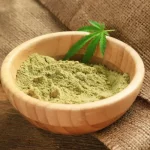
Vegan collagen is taking the wellness world by storm and for good reason. It’s a plant-based alternative to traditional animal-derived collagen supplements. But what exactly is it?
Essentially, vegan collagen powders are crafted from various plant ingredients that encourage your body to ramp up its production of collagen.
The key difference between vegan and animal-based collagens lies in their origin. While traditional collagens come directly from animals, like cows or fish, vegan versions do not contain actual collagen peptides which are proteins typically found in the connective tissues of these animals.
This might lead you to ask: if there aren’t any real collagen peptides in these products, can they still benefit me?
The answer is yes because science has our back here. Researchers have discovered specific plant compounds that signal our bodies to make more collagen.
The Ingredients of Vegan Collagen
An exploration of the various plant-based ingredients used in producing vegan collagen powder, highlighting how these components work together to support the body’s natural collagen production.
Amino Acids: The Building Blocks
Vegan collagen powders often start with amino acids like proline and glycine because they are crucial for creating protein structures within the body. While not actual collagen peptides themselves, these components set the stage for natural synthesis.
You’ll find lysine as well – another key player – which is vital since our bodies can’t make it on their own. This lineup aims to replicate the effects of traditional animal-derived amino profiles that contribute to bodily repair processes.
Vitamins & Minerals: Catalysts for Production
To get things moving along, vitamins like C and minerals such as zinc serve as essential co-factors. Vitamin C doesn’t just fend off colds; it also plays an integral role in linking those amino acids into stable proteins that form part of our connective tissues—a fancy way of saying ‘it helps keep you held together.’
Zinc takes charge by aiding in protein synthesis too which ensures the structure formed by those amino acids is strong enough to do its job effectively within your system.
Antioxidants: Protective Agents
Antioxidants from sources like camu camu or acerola cherry aren’t there just for show—they shield against cellular damage while boosting internal rebuilding efforts.
These antioxidants help neutralize free radicals – those pesky molecules that cause aging signs—and allow cells more breathing room to generate healthy tissue without interference.
Analogous to having clean tools ready at hand when starting construction—the better condition they’re in, the smoother the build will go.
Is Vegan Collagen Powder Collagen Peptides?
Vegan collagen powder often sparks curiosity for its name alone. It suggests a plant-based source of the same proteins found in animal tissues, yet true collagen peptides are inherently animal-derived, primarily from fish or bovine sources. The secret behind vegan ‘collagen’ lies not in what it contains but in how it works.
According to vegan bloggers in this space, the term ‘vegan collagen’ is somewhat misleading because these supplements don’t contain real collagen peptides. Instead, they consist of various plant extracts and compounds designed to encourage your body’s natural production of collagen. Recent studies have shown that certain ingredients like vitamin C and amino acids can help to stimulate this process effectively.
The Science Behind Plant-Based Collagen Boosters
To understand the concept further, we must delve into biochemistry just a bit. True animal-derived collagen provides direct building blocks—amino acids—for our bodies to use immediately in repairing connective tissues such as skin, hair, nails, bones, and ligaments.
In contrast, vegan alternatives rely on different components that support the synthesis of these vital proteins within us naturally over time—a method akin to nurturing a garden rather than buying cut flowers; you’re fostering growth from the ground up with nutrients rather than supplying ready-made structures.
Efficacy Compared To Animal-Derived Products
An important question many ask is whether these plant-based powders work as well as traditional supplements do. A publication by PubMed Central addresses this query through evidence suggesting that while not identical in function due to their indirect approach – they indeed hold promise, especially when combined with other health practices geared towards enhancing overall wellness and longevity.
Beyond individual benefits lie broader implications concerning sustainability where vegan options present clear advantages owing to less environmental strain during manufacturing compared with harvesting large quantities of marine or livestock elements needed for conventional collagens – an angle increasingly drawing consumer attention today amidst rising ecological concerns globally.
Health Benefits of Vegan Collagen Supplements

Vegan collagen supplements have become a buzzword in wellness circles, and for good reason. Unlike traditional collagen that’s derived from animal sources, these plant-based alternatives offer a host of health benefits without compromising ethical values.
Skin Health Support
The quest for youthful skin has led many to vegan collagen powders. These supplements may help maintain the elasticity and hydration of the skin. A study found that certain plant extracts can stimulate the production of human collagen type I – an essential component for maintaining skin structure and firmness.
This is great news because as we age, our body’s natural ability to produce collagen diminishes. Plant-based boosters like vegan collagen can step in to help support this vital process, potentially leading to smoother and more supple skin over time.
Joint Comfort and Mobility Enhancement
Joints are another area where vegan collagen shines. By supporting your body’s collagen manufacturing factory, it might just be easier to keep those knees moving smoothly on your morning jog or during yoga practice. The anti-inflammatory properties inherent in some ingredients used within these products could also lend themselves well toward joint comfort after physical activity or due to age-related stiffness.
Promoting Overall Wellness
Incorporating vegan protein into one’s diet isn’t just about building muscle; it’s also linked with general health improvements such as stronger nails and hair – which contain keratin, a protein reliant on amino acids present in many high-quality vegan proteins including those marketed as ‘collagen builders’.
Apart from personal appearance gains though there are deeper internal benefits too: gut health gets boosted thanks again largely due to elements found naturally occurring within plants – antioxidants polyphenols etc., all contributing towards an improved digestive system which indirectly supports better immunity levels overall making us less susceptible common illnesses even possibly chronic conditions down line if sustained long term use ensues alongside balanced lifestyle choices elsewhere (diet/exercise).
Evaluating the Effectiveness of Vegan Collagen
When you’re looking to support your body’s collagen production, vegan collagen powders are a hot topic. But how do they stack up against traditional animal-based supplements? A dive into the research shows that these plant-derived formulations aim to boost our natural processes rather than supply direct collagen peptides.
Recent studies have given us some insights. For instance, certain ingredients in vegan collagen powders like vitamin C and amino acids are proven contributors to collagen synthesis. They don’t just float around; they get right down to business by supporting your body’s production line.
The effectiveness of these products often comes under scrutiny since actual ‘vegan’ collagen is technically not possible—collagen is inherently animal-sourced. What we find on shelves labeled as ‘vegan’ instead contains elements that can promote our body’s ability to create collagen.
Comparing with Animal-Derived Collagen
Vegan alternatives claim their stake by offering consumers an ethical and sustainable choice. But does this mean a compromise in efficacy? Not necessarily.
A closer look at the composition reveals that these powders contain various nutrients critical for stimulating human fibroblasts – the cells responsible for churning out new proteins including collagens such as procollagen type I—a precursor molecule essential in forming stable fibers found within connective tissues.
To measure success, one must consider what ‘effectiveness’ means when it comes to supplements: if the goal is enhancing skin elasticity or joint health, then monitoring those outcomes becomes key—and anecdotal evidence from users has been largely positive about improvements in overall wellness after consistent use over time. While more longitudinal studies are needed, initial data paints a promising picture of potential benefits similar but not identical to those offered by bovine or marine sources.
In summing up current findings, while direct comparisons between vegan and non-vegan options aren’t black-and-white due to clear differences between them both structurally and biologically speaking; there’s growing confidence among scientists and nutritionists alike – that well-formulated plant-based alternatives could indeed be viable contenders alongside their established counterparts when considering environmental impact without sacrificing personal health goals.
Top Considerations When Choosing a Vegan Collagen Powder

Finding the right vegan collagen powder can feel like searching for a needle in a haystack. But fear not, there are clear markers that can guide you to high-quality choices.
Ingredient Quality and Source
The foundation of any good vegan collagen supplement is its ingredients. Look for products with proline and glycine, amino acids crucial for collagen production. Brands often source these from plants like bamboo silica or pea protein, which should be non-GMO and organic whenever possible.
You’ll also want to see vitamin C listed—this nutrient is vital because it acts as a catalyst in the body’s natural collagen synthesis process. A peek at the label should reveal whole food extracts such as acerola cherry, known for its rich vitamin C content.
Brand Reputation and Transparency
A brand’s reputation speaks volumes about its product quality. Established brands with positive reviews likely offer superior supplements compared to newer companies still proving themselves. Moreover, transparency matters; opt for companies that are upfront about their ingredient sourcing and manufacturing processes.
Certifications: Your Assurance of Standards Met
To make sure your choice aligns with ethical standards, check if they have certifications like USDA Organic or Non-GMO Project Verified—a nod towards cleaner ingredients—or Leaping Bunny certification indicating cruelty-free practices. These badges aren’t just window dressing; they represent adherence to rigorous guidelines ensuring product integrity from start to finish.
Efficacy Supported by Research
Vegan collagens rely on stimulating your own body’s production rather than supplying direct animal-derived peptides so ensure research backs up efficacy claims made by manufacturers. Clinical studies might indicate improved skin elasticity or joint health, a sign you’re investing in something worthwhile.
Selecting an ideal vegan collagen requires sifting through numerous options but keeping these key considerations front of mind simplifies this task considerably:
- Prioritize plant-based sources rich in proline and glycine supported by essential nutrients like Vitamin C.
- Gauge the trustworthiness of brands based on their history and customer feedback while assessing how transparently they share information regarding sourcing and processing methods.
- Look out for third-party certifications—they’re a solid sign that the product or service meets specific standards and is trustworthy.
How to Incorporate Vegan Collagen Powder into Your Diet
Vegan collagen powder is a unique addition to the world of dietary supplements. But you might be asking yourself, “How can I use this stuff?” Let’s get straight to it—there are several clever ways you can make vegan collagen part of your everyday eating habits.
Mixing with Liquids
The easiest method? Stir it into your drinks. Whether it’s your morning smoothie or a simple glass of water, vegan collagen powders typically have a neutral taste and dissolve well. Health benefits, like better skin hydration and elasticity, come from consistent intake, so adding it to something you drink daily is an effortless way to ensure regular consumption.
If coffee or tea is more your style, sprinkle some in there. Just remember that heat may potentially alter some nutrients in the powder—but don’t worry; many products are designed with heat stability in mind.
Elevating Meals and Snacks
Beyond beverages, try mixing vegan collagen powder into foods. Oatmeal or yogurt bowls gain extra nutritional value without changing their flavor profile when you mix in a scoopful. For lunchtime soups or dinner sauces, studies suggest that plant-based ingredients supporting natural collagen production remain effective even when cooked within recipes.
Are snacks more your thing? You got it. Bake them right into homemade energy bars or granola for on-the-go nourishment—the possibilities truly stretch as far as your culinary creativity does.
Finding Balance: Dosage and Timing Matters
Last but not least: pay attention to dosage recommendations provided by manufacturers—it’s key to reaping those desired health perks effectively. Medical sources emphasize the importance of following serving sizes for any supplement regimen including these powders. And timing matters too; consider taking them at times when they’ll best fit into absorption cycles—like alongside meals rich in vitamin C which can help optimize body synthesis.
All said incorporating vegan collagen isn’t just about keeping up with trends—it’s about finding smart ways that work for YOU every day while staying informed on how these practices affect overall wellness goals because personal experience trumps all.
The Environmental Impact of Vegan Collagen
When it comes to vegan collagen, the environmental perks are significant. Unlike traditional collagen sourced from animals, which often involves intensive farming practices and high carbon emissions, plant-based alternatives pave the way for a greener choice.
Sustainability of Plant-Based Ingredients
Vegan collagen powder is crafted using various eco-friendly ingredients. These components not only support your body’s natural ability to produce collagen but also promote agricultural biodiversity. The production processes tend to have a lower carbon footprint since plants can be sustainably harvested without causing long-term ecological damage.
Moreover, the cultivation of these plants typically requires less water and land compared to livestock farming. This conservation effort results in fewer greenhouse gases released into our atmosphere—making a strong case for why choosing vegan options matters so much for our planet’s health.
Ethical Considerations in Production
Beyond its lighter environmental touchstone, vegan collagen aligns with the ethical standards that more consumers demand today. It circumvents issues related to animal welfare inherent in conventional livestock operations where animals may live under stressful conditions before being used for their proteins. Animal rights organizations highlight these concerns, advocating instead for cruelty-free alternatives like those found in vegan supplements.
This ethical angle not only helps protect animal lives but also resonates with consumers looking to make purchases that reflect their values around sustainability and humane treatment—an intersection where vegan collagen stands out distinctly against its non-vegan counterparts.
Reducing Your Carbon Footprint With Vegan Options
Selecting plant-based products such as vegan collagen powders contributes towards reducing one’s carbon footprint, making them an excellent option for environmentally conscious individuals striving towards more sustainable living practices while still seeking out wellness benefits from their dietary choices.
In summary, shifting away from animal-derived supplements doesn’t just cater to personal health goals—it represents a meaningful step forward in nurturing an environment we all share.
About The Author:
Tyler Tafelsky is an endurance athlete and blogger at BetterTriathlete.com. In addition to writing about sports like cycling, running, and triathlon, Tyler competes in ultra-distance cycling races at the professional level.


